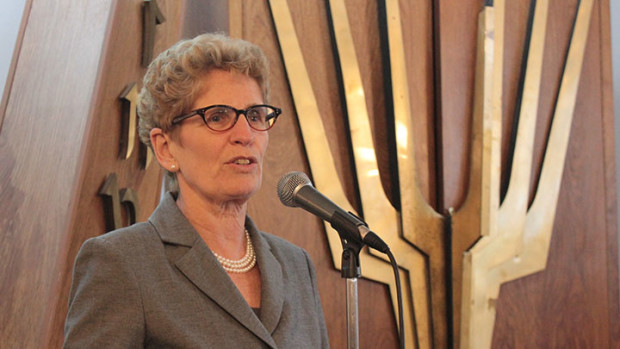


Ontario Premier Kathleen Wynne launched a $41-million multimedia campaign to end sexual violence and harassment last week, focusing on changes to legislation that would properly deal with the prevention and treatment of sexual assault victims.
The campaign, “It’s Never Okay” produced a YouTube video ad entitled #WhoWillYouHelp, painting a picture of gang rape, workplace harassment, sexting, and drink spiking.
In the video, male perpetrators say thanks to the viewer for keeping quiet, only to have the female victims later thank the viewer for speaking up. And while the issue of sexual assault is an ongoing and serious one, critics are saying the ad unfairly targets men.
University of Ottawa’s English professor Janice Fiamengo is one such critic.
“Canadians are already obligated to report crimes when they witness them,” Fiamengo said in an email interview, “so this video serves no good purpose except to vilify men as sexual predators and women their eternal victims, forever unable to speak for themselves.”
“It encourages co-workers and classmates to snitch on each other for a wide range of non-criminal behavior,” FIamengo said, adding, “that’s not a society I want to live in.”
Fiamengo also thinks the video is harmful in that it mixes together a variety of types of behaviour, some clearly criminal, others potentially innocuous, referring to a specific case she knows of, where a man was fired simply for dating a co-worker. Someone reported the man, Fiamengo said and he was later terminated as a result. What’s more, she said, is the co-worker has lived with that girlfriend for over 10 years now and has a child with her as well.
Sadie Weinstein, a student in the Bachelor of Public relations program at Humber College was shocked by the video and thinks sexual assault is pervasive, especially among women. “It’s pretty jarring to watch those kinds of situations because they’re obviously everyday situations,” Weinstein said.
Aly Vitunski, Senior Communications Advisor at the Office of the Ontario Ministery of Children and Youth Services said, “Sexual assault is a gender-based crime most often perpetrated by men against women,” adding, in reference to Statistics Canada’s 2006 figures, “It is estimated that one in three Canadian women will experience sexual assault in their adult life.”
Fiamengo said she’s not sure how Statistics Canada could get a one in three estimation, but she suspects the methodologies and questions asked in their studies are likely problematic. “I suppose it depends how you define ‘sexual assault,’ she said. “If an elbow in the boob in an elevator, or a leering look, counts as assault, then one can indeed imagine one in three.”
Weinstein, who also works on campus at the Humber Student Federation (HSF) admitted that the video doesn’t consider male victims or female perpetrators, recalling instances of her girl friends sharing nude photos of their male partners at times.
“I guess it’s kind of bias,” Weinstein said of the video, and that “it would be more accurate to show both sides.”
Vitunski said she knows that men also experience sexual violence, but that they have unique needs for support. “That is why we fund the Support Services for Male Survivors of Sexual Abuse program, which provides specialized services including counselling, peer support, and referrals to other appropriate community support services,” she said.






